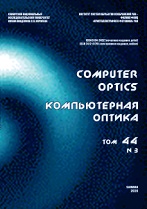|
This article is cited in 18 scientific papers (total in 18 papers)
OPTO-IT
Sharp focusing of a light field with polarization and phase singularities of an arbitrary order
V. V. Kotlyarab, S. S. Stafeevab, A. A. Kovalevab
a Samara National Research University, Moskovskoye shosse 34, 443086, Samara, Russia
b IPSI RAS – Branch of the FSRC “Crystallography and Photonics” RAS,
Molodogvardeyskaya 151, 443001, Samara, Russia
Abstract:
Using the Richards-Wolf formalism, we obtain general expressions for all components of the electric and magnetic strength vectors near the sharp focus of an optical vortex with the topological charge m and nth-order azimuthal polarization. From these equations, simple consequences are derived for different values of $m$ and $n$. If $m=n>1$, there is a non-zero intensity on the optical axis, like the one observed when focusing a vortex-free circularly polarized light field. If $n=m+2$, there is a reverse flux of light energy near the optical axis in the focal plane. The derived expressions can be used both for simulating the sharp focusing of optical fields with the double singularity (phase and polarization) and for a theoretical analysis of focal distributions of the intensity and the Poynting vector, allowing one to reveal the presence of rotational symmetry or the on-axis reverse energy flux, as well as the focal spot shape (a circle or a doughnut).
Keywords:
sharp focusing, Richards-Wolf formulae, optical vortex, topological charge, phase singularity, polarization singularity, Poynting vector, reverse flux of energy, focal spot symmetry.
Received: 12.03.2019
Accepted: 08.05.2019
Citation:
V. V. Kotlyar, S. S. Stafeev, A. A. Kovalev, “Sharp focusing of a light field with polarization and phase singularities of an arbitrary order”, Computer Optics, 43:3 (2019), 337–346
Linking options:
https://www.mathnet.ru/eng/co652 https://www.mathnet.ru/eng/co/v43/i3/p337
|

| Statistics & downloads: |
| Abstract page: | 252 | | Full-text PDF : | 96 | | References: | 25 |
|




 Contact us:
Contact us: Terms of Use
Terms of Use
 Registration to the website
Registration to the website Logotypes
Logotypes







 Citation in format
Citation in format 
